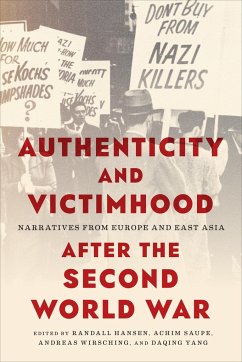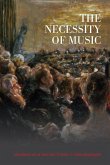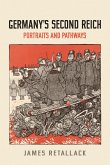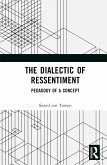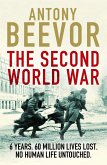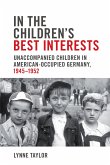Authenticity and Victimhood After the Second World War
Narratives from Europe and East Asia
Herausgeber: Hansen, Randall; Yang, Daqing; Wirsching, Andreas; Saupe, Achim
Authenticity and Victimhood After the Second World War
Narratives from Europe and East Asia
Herausgeber: Hansen, Randall; Yang, Daqing; Wirsching, Andreas; Saupe, Achim
- Gebundenes Buch
- Merkliste
- Auf die Merkliste
- Bewerten Bewerten
- Teilen
- Produkt teilen
- Produkterinnerung
- Produkterinnerung
This edited collection explores memories and experiences of genocide, civilian casualties, and other atrocities that occurred after the Second World War.
Andere Kunden interessierten sich auch für
![Dance on the Razor's Edge Dance on the Razor's Edge]() Svenja BethkeDance on the Razor's Edge26,99 €
Svenja BethkeDance on the Razor's Edge26,99 €![The Necessity of Music The Necessity of Music]() Celia ApplegateThe Necessity of Music62,99 €
Celia ApplegateThe Necessity of Music62,99 €![The Necessity of Music The Necessity of Music]() Celia ApplegateThe Necessity of Music93,99 €
Celia ApplegateThe Necessity of Music93,99 €![Germany's Second Reich Germany's Second Reich]() James RetallackGermany's Second Reich58,99 €
James RetallackGermany's Second Reich58,99 €![The Dialectic of Ressentiment The Dialectic of Ressentiment]() Sjoerd van TuinenThe Dialectic of Ressentiment123,99 €
Sjoerd van TuinenThe Dialectic of Ressentiment123,99 €![The Second World War The Second World War]() Antony BeevorThe Second World War15,99 €
Antony BeevorThe Second World War15,99 €![In the Children's Best Interests In the Children's Best Interests]() Lynne TaylorIn the Children's Best Interests62,99 €
Lynne TaylorIn the Children's Best Interests62,99 €-
-
-
This edited collection explores memories and experiences of genocide, civilian casualties, and other atrocities that occurred after the Second World War.
Hinweis: Dieser Artikel kann nur an eine deutsche Lieferadresse ausgeliefert werden.
Hinweis: Dieser Artikel kann nur an eine deutsche Lieferadresse ausgeliefert werden.
Produktdetails
- Produktdetails
- German and European Studies
- Verlag: University of Toronto Press
- Seitenzahl: 360
- Erscheinungstermin: 23. September 2021
- Englisch
- Abmessung: 232mm x 152mm x 30mm
- Gewicht: 714g
- ISBN-13: 9781487528218
- ISBN-10: 1487528213
- Artikelnr.: 62120290
- Herstellerkennzeichnung
- Produktsicherheitsverantwortliche/r
- Europaallee 1
- 36244 Bad Hersfeld
- gpsr@libri.de
- German and European Studies
- Verlag: University of Toronto Press
- Seitenzahl: 360
- Erscheinungstermin: 23. September 2021
- Englisch
- Abmessung: 232mm x 152mm x 30mm
- Gewicht: 714g
- ISBN-13: 9781487528218
- ISBN-10: 1487528213
- Artikelnr.: 62120290
- Herstellerkennzeichnung
- Produktsicherheitsverantwortliche/r
- Europaallee 1
- 36244 Bad Hersfeld
- gpsr@libri.de
Edited by Randall Hansen, Achim Saupe, Andreas Wirsching, and Daqing Yang
Introduction: Authenticity and Victimhood after the Second World War
Randall Hansen, Achim Saupe, Andreas Wirsching, and Daqing Yang
Part One: Methodological and Theoretical Approaches
1. From Hero’s Death to Suffering Victim? Reflections on the "Post-Heroic"
Culture of Memory
Andreas Wirsching
2. Victim Identities in the Public Sphere: Patterns of Shaping, Ranking,
and Reassessment
Michael Schwartz
Part Two: Victims of Genocide and Massacres
3. Eastern European Shoah Victims and the Problem of Group Identity
Ingo Loose
4. History on Trial before the Social Welfare Courts: Holocaust Survivors,
German Judges, and the Struggle for "Ghetto Pensions"
Jürgen Zarusky
5. Construction of Victimhood in Contemporary China: Toward a Post-Heroic
Representation of History?
Daqing Yang
6. "The Death of Manila" in World War II and Its Postwar Commemoration
Satoshi Nakano
Part Three: War Victims
7. Air Raid Victims in Japan’s Collective Remembrance of War
James Orr
8. Between Memory and Policy: How Societies of Leningrad Siege Survivors
Remember the War
Tatiana Voronina
9. Victims or Perpetrators or Both? How History Textbooks and History
Teachers in Post-Soviet Lithuania Remember Postwar Partisans
Barbara Christophe
Part Four: Victims of Forced Migration and Deportations
10. In Search of a Usable Memory: Politics of History and the Commemoration
Day for German Forced Migrants after World War II
Mathias Beer
11. Of Italian Perpetrators and Victims: Forced Migration in the
Italian-Yugoslavian Border Region (1922-54)
Tobias Hof
12. Defiant Victims: The Deportation of the Chechens and the Memory of
Stalinism in the Soviet Union and Russia
Moritz Florin
13. East Asian Victimhood Goes to Paris: A Consideration of WWII-Related
Chinese, Japanese, and Korean Nominations to UNESCO’s Memory of the World
Project
Lori Watt
Randall Hansen, Achim Saupe, Andreas Wirsching, and Daqing Yang
Part One: Methodological and Theoretical Approaches
1. From Hero’s Death to Suffering Victim? Reflections on the "Post-Heroic"
Culture of Memory
Andreas Wirsching
2. Victim Identities in the Public Sphere: Patterns of Shaping, Ranking,
and Reassessment
Michael Schwartz
Part Two: Victims of Genocide and Massacres
3. Eastern European Shoah Victims and the Problem of Group Identity
Ingo Loose
4. History on Trial before the Social Welfare Courts: Holocaust Survivors,
German Judges, and the Struggle for "Ghetto Pensions"
Jürgen Zarusky
5. Construction of Victimhood in Contemporary China: Toward a Post-Heroic
Representation of History?
Daqing Yang
6. "The Death of Manila" in World War II and Its Postwar Commemoration
Satoshi Nakano
Part Three: War Victims
7. Air Raid Victims in Japan’s Collective Remembrance of War
James Orr
8. Between Memory and Policy: How Societies of Leningrad Siege Survivors
Remember the War
Tatiana Voronina
9. Victims or Perpetrators or Both? How History Textbooks and History
Teachers in Post-Soviet Lithuania Remember Postwar Partisans
Barbara Christophe
Part Four: Victims of Forced Migration and Deportations
10. In Search of a Usable Memory: Politics of History and the Commemoration
Day for German Forced Migrants after World War II
Mathias Beer
11. Of Italian Perpetrators and Victims: Forced Migration in the
Italian-Yugoslavian Border Region (1922-54)
Tobias Hof
12. Defiant Victims: The Deportation of the Chechens and the Memory of
Stalinism in the Soviet Union and Russia
Moritz Florin
13. East Asian Victimhood Goes to Paris: A Consideration of WWII-Related
Chinese, Japanese, and Korean Nominations to UNESCO’s Memory of the World
Project
Lori Watt
Introduction: Authenticity and Victimhood after the Second World War
Randall Hansen, Achim Saupe, Andreas Wirsching, and Daqing Yang
Part One: Methodological and Theoretical Approaches
1. From Hero’s Death to Suffering Victim? Reflections on the "Post-Heroic"
Culture of Memory
Andreas Wirsching
2. Victim Identities in the Public Sphere: Patterns of Shaping, Ranking,
and Reassessment
Michael Schwartz
Part Two: Victims of Genocide and Massacres
3. Eastern European Shoah Victims and the Problem of Group Identity
Ingo Loose
4. History on Trial before the Social Welfare Courts: Holocaust Survivors,
German Judges, and the Struggle for "Ghetto Pensions"
Jürgen Zarusky
5. Construction of Victimhood in Contemporary China: Toward a Post-Heroic
Representation of History?
Daqing Yang
6. "The Death of Manila" in World War II and Its Postwar Commemoration
Satoshi Nakano
Part Three: War Victims
7. Air Raid Victims in Japan’s Collective Remembrance of War
James Orr
8. Between Memory and Policy: How Societies of Leningrad Siege Survivors
Remember the War
Tatiana Voronina
9. Victims or Perpetrators or Both? How History Textbooks and History
Teachers in Post-Soviet Lithuania Remember Postwar Partisans
Barbara Christophe
Part Four: Victims of Forced Migration and Deportations
10. In Search of a Usable Memory: Politics of History and the Commemoration
Day for German Forced Migrants after World War II
Mathias Beer
11. Of Italian Perpetrators and Victims: Forced Migration in the
Italian-Yugoslavian Border Region (1922-54)
Tobias Hof
12. Defiant Victims: The Deportation of the Chechens and the Memory of
Stalinism in the Soviet Union and Russia
Moritz Florin
13. East Asian Victimhood Goes to Paris: A Consideration of WWII-Related
Chinese, Japanese, and Korean Nominations to UNESCO’s Memory of the World
Project
Lori Watt
Randall Hansen, Achim Saupe, Andreas Wirsching, and Daqing Yang
Part One: Methodological and Theoretical Approaches
1. From Hero’s Death to Suffering Victim? Reflections on the "Post-Heroic"
Culture of Memory
Andreas Wirsching
2. Victim Identities in the Public Sphere: Patterns of Shaping, Ranking,
and Reassessment
Michael Schwartz
Part Two: Victims of Genocide and Massacres
3. Eastern European Shoah Victims and the Problem of Group Identity
Ingo Loose
4. History on Trial before the Social Welfare Courts: Holocaust Survivors,
German Judges, and the Struggle for "Ghetto Pensions"
Jürgen Zarusky
5. Construction of Victimhood in Contemporary China: Toward a Post-Heroic
Representation of History?
Daqing Yang
6. "The Death of Manila" in World War II and Its Postwar Commemoration
Satoshi Nakano
Part Three: War Victims
7. Air Raid Victims in Japan’s Collective Remembrance of War
James Orr
8. Between Memory and Policy: How Societies of Leningrad Siege Survivors
Remember the War
Tatiana Voronina
9. Victims or Perpetrators or Both? How History Textbooks and History
Teachers in Post-Soviet Lithuania Remember Postwar Partisans
Barbara Christophe
Part Four: Victims of Forced Migration and Deportations
10. In Search of a Usable Memory: Politics of History and the Commemoration
Day for German Forced Migrants after World War II
Mathias Beer
11. Of Italian Perpetrators and Victims: Forced Migration in the
Italian-Yugoslavian Border Region (1922-54)
Tobias Hof
12. Defiant Victims: The Deportation of the Chechens and the Memory of
Stalinism in the Soviet Union and Russia
Moritz Florin
13. East Asian Victimhood Goes to Paris: A Consideration of WWII-Related
Chinese, Japanese, and Korean Nominations to UNESCO’s Memory of the World
Project
Lori Watt

